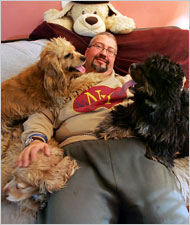From www.slate.com:
You can't stop tanning; the best you can do is help people control it. Toward that end, the industrialization of ultraviolet light is a blessing. It gives us the power to clarify, modulate, and customize dosage. Salons need oversight to make sure they help clients understand and manage this power. But if you shut them down or lock out teenagers, be prepared to enforce a dawn-to-dusk curfew or face an epidemic of skin cancer. If you liked back-alley abortions, you'll love backyard tanning.
For those of my readers in their teens and twenties, my advice to you is not to tan. If you do, you'll be sorry 5-10 years from now when you develop wrinkles. And there is always the risk of skin cancer.
Tuesday, May 16, 2006
Monday, May 15, 2006
Dogs and Ducks for Depression

I think that we're all aware of service animals for the physically disabled, especially the blind. But now patients with psychiatric disorders are claiming that their dogs are "emotional service dogs," often with dubious rationales:
"If you have backing of a medical professional and you can show a connection between a disabling condition and the keeping of an animal, I have 99.9 percent success," said Karen Copeland, a tenants' lawyer.
One of her current clients maintains that she needs an animal in her apartment because she is a recovering alcoholic and, apart from her pet, all her other friends are drinkers.
Even ducks are getting in on the act:
These days people rely on a veritable Noah's Ark of support animals. Tami McLallen, a spokeswoman for American Airlines, said that although dogs are the most common service animals taken onto planes, the airline has had to accommodate monkeys, miniature horses, cats and even an emotional support duck. "Its owner dressed it up in clothes," she recalled.
My opinion on the matter:
This isn't cute and is a total insult to the disabled community. They are ruining it for people who need it."
Thursday, May 11, 2006
Surgical Teamwork
The New York Times reports on a study of operating room communications:
"nurses often describe good collaboration as having their input respected, and physicians often describe good collaboration as having nurses who anticipate their needs and follow instructions."
There is a bit of a culture clash; nurses want respect, and surgeons want submissive, helpful nurses.
"nurses often describe good collaboration as having their input respected, and physicians often describe good collaboration as having nurses who anticipate their needs and follow instructions."
There is a bit of a culture clash; nurses want respect, and surgeons want submissive, helpful nurses.
Monday, May 08, 2006
Dunlop Disease
 A new epidemic is spreading across America:
A new epidemic is spreading across America:A model's flesh squeezes out between her blue jeans and tank top in what is known as "Dunlop disease," as in her flab "dun lap" over her pants
Subscribe to:
Comments (Atom)
